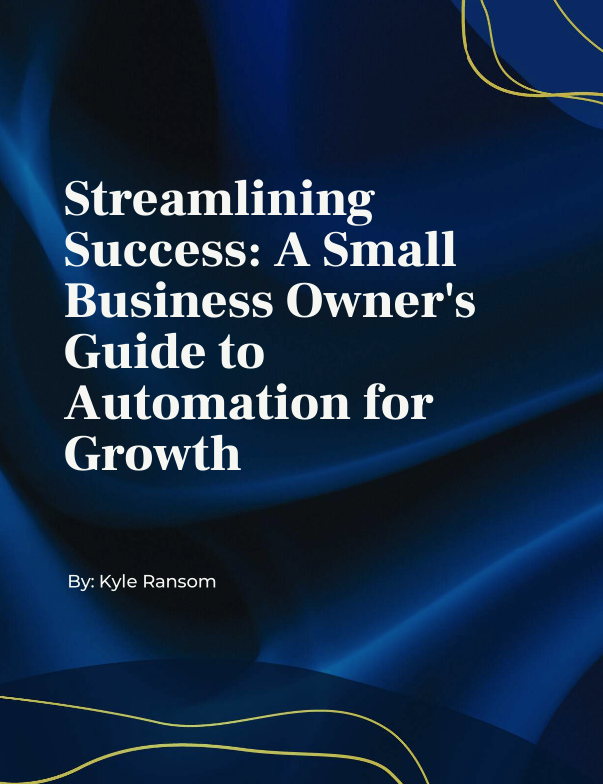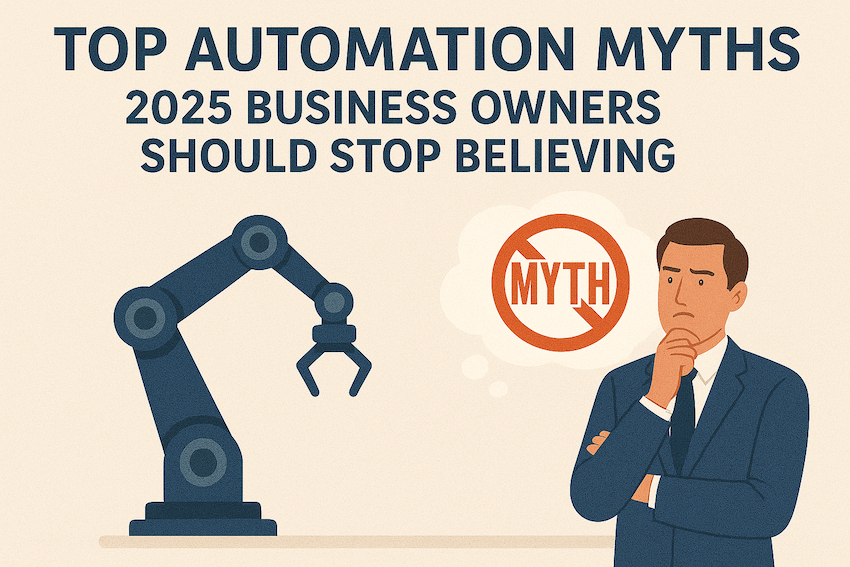
Debunking Top Automation Myths 2025: What SBOs Need to Know
Automation myths 2025 are a dime a dozen—and unfortunately, they’re slowing down a lot of small business owners more than they realize. In today’s digital-first economy, avoiding automation is not just outdated—it’s risky.
As someone who works closely with distressed small businesses prepping for acquisition or pivoting to stay afloat, I see it over and over. There’s massive resistance to tools and systems that could literally double their profits or reduce overwhelm overnight.
Many of these holdouts are rooted in outdated ideas—things that maybe were true five years ago but absolutely aren’t today. And with tech evolving so rapidly, ignoring the shift is like refusing to use a calculator because you’re good at math.
This post aims to unpack the real danger of buying into these myths, especially at a time when margins are thin and time is even thinner. If automation seems unaffordable, complex, or just ‘not for you,’ keep reading.
You’ll learn how killing these myths can boost your valuation, create scalable systems, and unclog the bottlenecks that scare buyers away from small businesses.

Myth #1: Automation is Too Expensive for Small Businesses
This is probably the most common myth in the book. People see massive ERP systems or industrial robots and think, “I can’t afford that.” But the truth is, automation myths 2025 forget something critical: context. Today, platforms like Zapier, HubSpot, and ActiveCampaign offer robust automation tools starting at less than $100 a month.
If you’re in Small Business Automation, the cost of not automating is higher than the subscription fee. Every hour you spend manually entering data or chasing leads is money walking out the door. Want to increase your EBIT before a sale? Automating your operations is one of the best ways to do it.
Myth #2: Automation Replaces Good People
Let’s clear this up: automation isn’t about replacing humans—it’s about removing repetition. Your best people shouldn’t be buried in busy work. Automate the mind-numbing stuff so your team can focus on high-value tasks—like relationship-building, strategy, and innovation.
Also, from a buyer’s perspective? A business that requires fewer people to run efficiently is more attractive. As someone who’s structured exits for SBOs, I can confirm: operational redundancy equals higher deal multiples.
Myth #3: Automation Only Works for Tech Companies
If I had a dollar for every time I heard this… Truth is, automation is use-case driven—not industry specific. Whether you run a landscaping company or a specialty bakery, if your service flow can be mapped, it can be automated.
Invoices, follow-ups, scheduling, proposal generation—even customer onboarding. There are plug-and-play tools for all of these. Just because you’re not a SaaS company doesn’t mean you can’t adopt systems that scale like one.
Myth #4: Automation Is Too Complex to Implement
In 2025, no-code and low-code platforms have destroyed this myth. You don’t need to be a programmer (or hire one) to automate workflows anymore. Platforms like Make, Pabbly, and Airtable offer intuitive UX and drag-and-drop builds.
And here’s the thing: you don’t have to automate everything at once. Pick one bottleneck. Automate it. Watch your team’s slack messages drop and your output rise. Small wins compound—and they impress potential acquirers when due diligence season rolls around.
What are the biggest Automation Myths 2025?
The most common ones are that automation is too costly, too hard to implement, or just for big corporations. These are outdated beliefs that can limit growth and scalability.
Is automation really necessary for a small business?
In today’s market, yes. Automation reduces human error, lowers operating costs, and makes systems more efficient—which is key in improving your business valuation.
Can automation hurt team morale?
Only if it’s poorly communicated. When done right, automation actually improves morale by eliminating repetitive, draining tasks and allowing your team to focus on more meaningful work.
What’s the ROI of automating small business functions?
Return on investment can be massive—usually 3–10x over time via labor savings, faster processing, reduced scope creep, and increased customer satisfaction.
How do I start automating my business?
Start by mapping your top 5 repetitive processes. Then, use a platform like Zapier or Keap to automate the lowest-hanging fruit. Track the results, then scale.
Final Thoughts: Busting Automation Myths 2025 Will Move Your Business Forward
If you’re still buying into the hype of these outdated Automation myths 2025, you’re not just missing out—you’re falling behind. Automation isn’t a luxury anymore—it’s part of the survival kit for today’s small businesses.
I’ve helped owners transform stressed, unscalable companies into acquisition-ready assets just by streamlining using simple tools. The results speak for themselves: better valuation, smoother operations, and less founder burnout.
Ready to stop guessing and start doing? Download our free automation strategy guide or hit me up for a custom automation audit. Your future buyer will thank you.


No responses yet